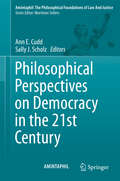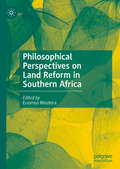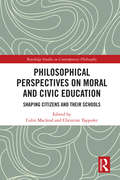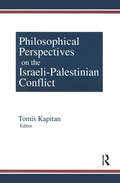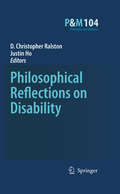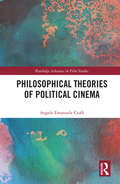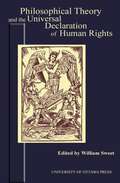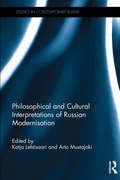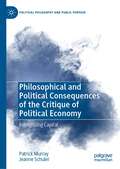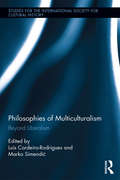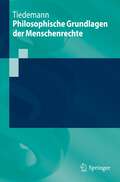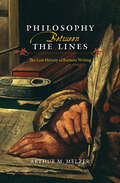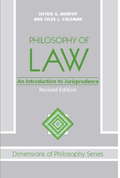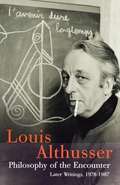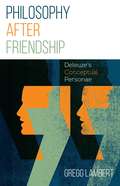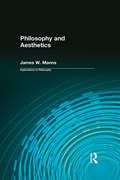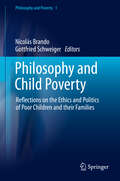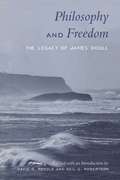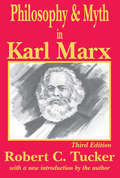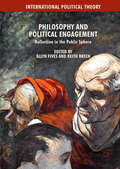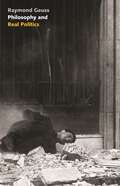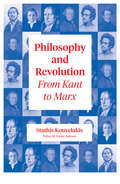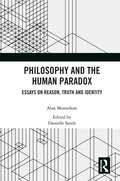- Table View
- List View
Philosophical Perspectives on Democracy in the 21st Century
by Ann E. Cudd Sally J. ScholzThis work offers a timely philosophical analysis of fundamental principles of democracy and the meaning of democracy today. It explores the influence of big money and capitalism on democracy, the role of information and the media in democratic elections, and constitutional issues that challenge democracy in the wake of increased threats to privacy since 2001 and in light of the Citizens United decision of the US Supreme Court. It juxtaposes alternate positions from experts in law and philosophy and examines the question of legitimacy, as well as questions about the access to information, the quality of information, the obligations to attain epistemic competence among the electorate, and the power of money. Drawing together different political perspectives, as well as a variety of disciplines, this collection allows readers the opportunity to compare different and opposing moral and political solutions that both defend and transform democratic theory and practice.
Philosophical Perspectives on Land Reform in Southern Africa
by Erasmus MasiteraThis edited collection explores a variety of philosophical perspectives on land reform in Southern Africa. Presenting an innovative focus on the philosophical themes in land reform, the contributors reflect on traditional African conceptualisations of the land, as well as Western interpretations, introducing specifically Southern African approaches to a wide range of debates. Rooted in questions of colonization and decolonization, the chapters examine what reform ought to do for the people of Africa, providing contemporary reflections on the different racial and cultural facets of the land. Notably, ideas of reconciliation, compensation, justice, development, emancipation, Ubuntu, and empowerment are explored. Vigorous and interdisciplinary in their approach, the fifteen original chapters tackle a range of questions such as: What does land mean in Africa? What ethical considerations are relevant? Which mechanisms should be used in addressing injustice regarding land reform and redistribution? Providing a comprehensive engagement with philosophical and political issues of land reform in Southern Africa, this volume is an invaluable resource to scholars, not only in Africa, but wherever similar questions of land, dispossession, and justice arise.
Philosophical Perspectives on Moral and Civic Education: Shaping Citizens and Their Schools (Routledge Studies in Contemporary Philosophy)
by Colin Macleod Christine TappoletMany people place great stock in the importance of civic virtue to the success of democratic communities. Is this hope well-grounded? The fundamental question is whether it is even possible to cultivate ethical and civic virtues in the first place. Taking for granted that it is possible, at least three further questions that arise: What are the key elements of civic virtue? How should we cultivate these virtuous dispositions? And finally, how should schools be organized in order to make the education of citizen possible? These interrelated questions are the focus of this collection. By considering these questions from a variety of philosophical perspectives ranging from moral psychology, philosophy of education, and political philosophy, the nine essays assembled here advance our understanding of the challenges we face in trying to shape children to be virtuous citizens.
Philosophical Perspectives on the Israeli-Palestinian Conflict
by Tomis KapitanThis volume addresses a number of philosophical problems that arise in consideration of the century-old conflict between Israeli Jews and Palestinian Arabs. Consisting of essays by fifteen contributors (including both Israeli and Palestinian philosophers) and a lengthy introduction by the editor, it deals with rights to land, sovereignity, self-determination, the existence and legitimacy of states, cultural prejudice, national identity, intercommunal violence, and religious intransigence.
Philosophical Reflections on Disability
by D. Christopher Ralston Justin HoThis project draws together the diverse strands of the debate regarding disability in a way never before combined in a single volume. After providing a representative sampling of competing philosophical approaches to the conceptualization of disability as such, the volume goes on to address such themes as the complex interplay between disability and quality of life, questions of social justice as it relates to disability, and the personal dimensions of the disability experience. By explicitly locating the discussion of various applied ethical questions within the broader theoretical context of how disability is best conceptualized, the volume seeks to bridge the gap between abstract philosophical musings about the nature of disease, illness and disability found in much of the philosophy of medicine literature, on the one hand, and the comparatively concrete but less philosophical discourse frequently encountered in much of the disability studies literature. It also critically examines various claims advanced by disability advocates, as well as those of their critics. In bringing together leading scholars in the fields of moral theory, bioethics, and disability studies, this volume makes a unique contribution to the scholarly literature, while also offering a valuable resource to instructors and students interested in a text that critically examines and assesses various approaches to some of the most vexing problems in contemporary social and political philosophy.
Philosophical Theories of Political Cinema (Routledge Advances in Film Studies)
by Angelo Emanuele CioffiThis book utilizes philosophical tools to build up a framework for the classification, analysis, and assessment of political cinema. The author first maps the category of political cinema, clarifying what it means for a film to be ‘political’, and then analyzes the relation between the value of a film as a political film and its value as art. Through philosophical enquiry, Angelo Cioffi builds up a framework that could be of use in art-critical practice and that can help with the classification and assessment of political films. Grounded in analytic philosophy of art and cognitivist film theory, with insights from political science, political philosophy, epistemology, and cognitive science, the book presents a unique analysis of the relation between films and the ‘political’. This theory is tested with detailed case studies, and the author uses specific films as examples of the applicability and explanatory power of this theoretical framework. As such, this book will be of interest not just to film studies, film theory and political philosophy scholars, but to anyone with an interest in political film, aesthetic practice, and philosophy of art.
Philosophical Theory and the Universal Declaration of Human Rights
by William SweetPhilosophical Theory and the Universal Declaration of Human Rights examine the relations and interrelations among theoretical and practical analyses of human rights. This volume draws on the works of philosophers, political theorists and those involved in the implementation of human rights.
Philosophical and Cultural Interpretations of Russian Modernisation (Studies in Contemporary Russia)
by Arto Mustajoki Katja LehtisaariIn this book the expert international contributors attempt to answer questions such as: How far is it possible to attribute change in contemporary Russia as due to cultural factors? How does the process of change in cultural institutions reflect the general development of Russia? Are there certain philosophical ideas that explain the Russian interpretation of a modern state? This edited volume elaborates on processes of Russian modernisation regarding a wide range of factors, including the use of modern technology, elements of civil society, a reliable legal system, high levels of education, equality among citizens, freedom of speech, religion and trade. The main focus is on the Putin era but historical backgrounds are also discussed, adding context. The chapters cover a wide spectrum of research fields from philosophy and political ideas to gender issues, language, the education system, and the position of music as a constituent of modern identity. Throughout the book the chapters are written so as to introduce experts from other fields to new perspectives on Russian modernisation, and de-modernisation, processes. It will be of great interest to postgraduates and scholars in Philosophy, Politics, IR, Music and Cultural Studies, and, of course, Russian studies.
Philosophical and Political Consequences of the Critique of Political Economy: Recognizing Capital (Political Philosophy and Public Purpose)
by Patrick Murray Jeanne SchulerThis book extends the approach that Murray and Schuler develop in their companion volume, False Moves in Philosophy and Social Theory: Losing Public Purpose. The chapters form a connected inquiry into consequences of capital, a far-reaching social form, through a critique of political economy and the mindset it shares with much modern philosophy and social theory. The authors call this bifurcating mentality factoring philosophy. Factoring philosophy mistakes the distinguishable for the separable. It splits the subjective and objective, form and content, and it takes the object of social theory to be an impossible economy-in-general, stripped of constitutive social forms. The critique of factoring philosophy structures the collection, which makes a wide-ranging contribution to the research field of the critique of political economy as critical social theory. Ultimately, this book solidifies Murray and Schuler’s impact on the study of political economy, political philosophy, modern philosophy, Hegel, Marx, and critical theory.
Philosophies of Multiculturalism: Beyond Liberalism (Studies for the International Society for Cultural History #9)
by Luís Cordeiro-Rodrigues Marko SimendićThis edited collection offers a comparative approach to the topic of multiculturalism, including different authors with contrasting arguments from different philosophical traditions and ideologies. It puts together perspectives that have been largely neglected as valid normative ways to address the political and moral questions that arise from the coexistence of different cultures in the same geographical space. The essays in this volume cover both historical perspectives, taking in the work of Hobbes, Tocqueville and Nietzsche among others, and contemporary Eastern and Western approaches, including Marxism, anarchism, Islam, Daoism, Indian and African philosophies.
Philosophische Grundlagen der Menschenrechte (Springer-Lehrbuch)
by Paul TiedemannDieses Lehrbuch stellt zunächst eine Reihe von klassischen philosophischen Ansätzen vor, um zu zeigen, dass sie als Grundlage für die Menschenrechte ungeeignet sind. Nur das Konzept der Menschenwürde - basierend auf der kantischen Unterscheidung von Preis und Würde – ist als Grundlage geeignet. Die Ableitung der Menschenrechte aus dem Prinzip der Menschenwürde erlaubt es, das entscheidende Merkmal der Menschenrechte zu identifizieren, nämlich den Schutz der Personalität. Dies wiederum ermöglicht es, (1) die Menschenrechte sinnvoll zu interpretieren, (2) zwischen echten und unechten moralischen Menschenrechten zu unterscheiden, (3) den Schutzumfang vieler kodifizierter Menschenrechte nach den Kriterien „Kern“ und „Hof“ zu differenzieren und bietet (4) einen Ausgangspunkt für die „Entdeckung“ neuer, ungeschriebener Menschenrechte. Diese philosophische Grundlage ermöglicht eine grundlegende Neubewertung der Rechtsprechung zu den Menschenrechten, die es letztlich ermöglichen wird, sie im Hinblick auf Rechtssicherheit, Klarheit und Schlüssigkeit zu verbessern.Das Lehrbuch richtet sich in erster Linie an fortgeschrittene Studierende der Rechtswissenschaft, die an einem tieferen Verständnis der Menschenrechte interessiert sind. Es eignet sich aber auch für Studierende der Geisteswissenschaften und für alle, die im politischen oder sozialen Bereich tätig sind und sich mit Menschenrechten und deren Durchsetzung befassen.Jedes Kapitel ist in vier Teile gegliedert: Zusammenfassungen, Vorlesung, empfohlene Lektüre und Fragen, um das Verständnis des Lesers zu überprüfen. Musterantworten sind am Ende des Buches enthalten.
Philosophy Between the Lines: The Lost History of Esoteric Writing
by Arthur M. Melzer&“Shines a floodlight on a topic that has been cloaked in obscurity . . . a landmark work in both intellectual history and political theory&” (The Wall Street Journal). Philosophical esotericism—the practice of communicating one&’s unorthodox thoughts &“between the lines&”—was a common practice until the end of the eighteenth century. Despite its long and well-documented history, however, esotericism is often dismissed today as a rare occurrence. But by ignoring esotericism, we risk cutting ourselves off from a full understanding of Western philosophical thought. Walking readers through both an ancient (Plato) and a modern (Machiavelli) esoteric work, Arthur M. Melzer explains what esotericism is—and is not. It relies not on secret codes, but simply on a more intensive use of familiar rhetorical techniques like metaphor, irony, and insinuation. Melzer explores the various motives that led thinkers in different times and places to engage in this strange practice, while also exploring the motives that lead more recent thinkers not only to dislike and avoid this practice but to deny its very existence. In the book&’s final section, &“A Beginner&’s Guide to Esoteric Reading,&” Melzer turns to how we might once again cultivate the long-forgotten art of reading esoteric works. The first comprehensive, book-length study of the history and theoretical basis of philosophical esotericism, Philosophy Between the Lines is &“a treasure-house of insight and learning. It is that rare thing: an eye-opening book . . . By making the world before Enlightenment appear as strange as it truly was, [Melzer] makes our world stranger than we think it is&” (George Kateb, Professor of Politics, Emeritus, at Princeton University). &“Brilliant, pellucid, and meticulously researched.&” —City Journal
Philosophy Of Law
by Jeffrie G. Murphy Jules ColemanThis leading anthology contains legal cases and essays written by the finest scholars in legal philosophy, representing all major points of view on the most central topics in philosophy of law. Its primary focus is to relate traditional themes of legal philosophy to the concerns of modern society in a way that invigorates one and illuminates the other, respectively. This classic text is distinguished by its clarity, balance of topics, balance of substantive positions on controversial questions, topical relevance, imaginative use of cases and stories, and the inclusion of only lightly edited or untouched classics. This revision is distinguished in its inclusion of many articles relevant to terrorism and torture, contract and property, and a greater emphasis on concrete legal problems.
Philosophy Of Law
by Jeffrie G. Murphy Jules ColemanIn this revised edition, two distinguished philosophers have extended and strengthened the most authoritative text available on the philosophy of law and jurisprudence. While retaining their comprehensive coverage of classical and modern theory, Murphy and Coleman have added new discussions of the Critical Legal Studies movement and feminist jurisprudence, and they have strengthened their treatment of natural law theory, criminalization, and the law of torts. The chapter on law and economics remains the best short introduction to that difficult, controversial, and influential topic.Students will appreciate the careful organization and clear presentation of complicated issues as well as the emphasis on the relevance of both law and legal theory to contemporary society.
Philosophy Of Law
by Jeffrie G. Murphy Jules ColemanIn this revised edition, two distinguished philosophers have extended and strengthened the most authoritative text available on the philosophy of law and jurisprudence. While retaining their comprehensive coverage of classical and modern theory, Murphy and Coleman have added new discussions of the Critical Legal Studies movement and feminist jurisprudence, and they have strengthened their treatment of natural law theory, criminalization, and the law of torts. The chapter on law and economics remains the best short introduction to that difficult, controversial, and influential topic.Students will appreciate the careful organization and clear presentation of complicated issues as well as the emphasis on the relevance of both law and legal theory to contemporary society.
Philosophy Of The Encounter: Later Writings, 1978-1987
by Louis Althusser G. M. Goshgarian Francois Matheron Oliver CorpetIn the late 1970s and 1980s, Louis Althusser endured a period of intense mental instability during which he murdered his wife and was committed to a psychiatric hospital. Spanning this deeply troubling period, this fourth and final volume of political and philosophical writings reveals Althusser wrestling in a creative and unorthodox fashion with a whole series of theoretical problems to produce some of his very finest work. In his profound exploration of questions of determinism and contingency, Althusser developed a "philosophy of the encounter," which he links to a hidden and subterranean tradition in the history of Western thought which stretches from Epicurus through Spinoza and Machiavelli to Marx, Derrida and Heidegger.
Philosophy after Friendship: Deleuze’s Conceptual Personae
by Gregg LambertThe friend, the enemy, the stranger, the refugee or deportee, and the survivor. In singular and provocative fashion, Gregg Lambert&’s Philosophy after Friendship introduces us to the key social personae that have populated modern political philosophy. Drawing on the philosophies of Deleuze and Derrida, as well as the work of Indo-European linguist Émile Benveniste, Lambert constructs a genealogy to demonstrate how political thought has been structured by the emergence of such &“conceptual personae.&” At the center of Philosophy after Friendship is the persona of the friend, together with the idea of friendship, on which the democratic ideals of consensus, fraternity, and equality are based. Lambert argues that the vitality of this conceptual persona, originated by the Greeks, has been exhausted by centuries of war. In fact, we might today be witnessing the overturning of an earlier philosophical idealism that saw friendship as the destination of the political and, in its place, the emergence of a nonphilosophical understanding that has set perpetual war as the ultimate ground from which future thinking of the political must depart. In his Conclusion, Lambert proposes a truly &“postwar philosophy&” that takes as its first principle the idea of perpetual peace, which would require nothing less than a complete reevaluation of the goals of any future political philosophy, if not the meaning of philosophy itself.
Philosophy and Aesthetics: Aesthetics And Metaphysics (Brill's Studies In Intellectual History #Vol. 45)
by James W. MannsJames Manns presents a readable and entertaining examination of the most serious questions posed by the arts and our relation to them. In a clear and engaging fashion, he explores the central issues in aesthetics: aesthetic judgment, the nature and role of criticism, the elusiveness of the concept of art, and communication through art, and he critically (but sympathetically) considers that principal theories of art that focus on expression, form, and representation. Through the use of extensive, entertaining, and current examples (including film), Manns conveys the solid basics relating to the history and development of aesthetic theories, tries out these various theories against the art of the last half century, then outlines his own view revolving around the artist's intention and the act of communication.
Philosophy and Child Poverty: Reflections on the Ethics and Politics of Poor Children and their Families (Philosophy and Poverty #1)
by Gottfried Schweiger Nicolás BrandoThis book offers a broad and diverse reflection of the ways in which child poverty could be conceptualised, and the ways in which it is intertwined with childhood as a specific social condition. Furthermore, the responsibilities towards children and the possible mechanisms required for dealing with this condition will be analysed and clarified. This is the first volume on philosophy and child poverty. Despite the increasing number of publications on poverty, the particular phenomenon of poverty during childhood has not received much philosophical attention. This is surprising, given the severity and depth of child poverty around the globe. This volume brings together various philosophical approaches and how they understand and tackle child poverty. This is an important addition to the philosophical literature, which is also of wider interest to scholars working in the social sciences and with an interest in child poverty.
Philosophy and Freedom: The Legacy of James Doull (Toronto Studies in Philosophy)
by David Peddle Neil RobertsonJames Doull's remarkable legacy as a teacher, scholar, and thinker has left behind a profound and challenging examination of the philosophical and historical roots of contemporary thought and politics. His life's work was devoted to a reflection on freedom in its philosophical and historical context and, more specifically, to looking beneath the commonly accepted forms of North American and Continental thought and discovering a deeper theoretical and practical development. David Peddle and Neil Robertson have collected Doull's essays on the history of western thought and freedom, from the Ancient period to the Post-Modern era, and have provided an introduction that places them in the context of Doull's overall project.Commentaries on his intricate works by twelve former colleagues and students explore various aspects of Doull's history and place it within the context of contemporary scholarship, allowing the reader to judge the depth and rigour of Doull's writing. Together, the texts and commentaries provide a long-overdue introduction to and analysis of Doull's thought, offering further insight into a longstanding and significant dialogue in Canadian philosophy and classical studies, and bringing out a penetrating analysis of the philosophical underpinnings of the contemporary world.
Philosophy and Myth in Karl Marx
by Robert C. TuckerIn Karl Marx's early writing (first made available many years after his death) his economic interpretation of history and his concept of communism were set in a comprehensive philosophical framework. Marx's main preoccupation at this time was with man estranged from himself in an alienated world: a subjective, almost religious theme.Taking full account of these earlier writings, Robert Tucker critiques and reinterprets Marx's thought. He shows how its origins can be located in earlier German philosophers, in particular Kant, Hegel, and Feuerbach. Reconstructing the genesis of Marxism in its founder's own mind, he clarifies Marx's mystifying contention that Marxism represented Hegelianism turned 'on its head'. He then presents a new interpretation, based on close textual analysis, of the relation between Marx's early philosophical system and the subsequent materialist conception of history as expounded in the later and best known writings of Marx and Engels. Against this background, Tucker presents Das Kapital as a work belonging to the post-Hegelian mythical development of Germany philosophy. Considering in turn the genesis of Marxism and the underlying continuity of his thought from the early writings to Das Kapital, Tucker shows the theme of alienation is central throughout.In the years since the book was first written, comments and criticism have encouraged Tucker to change his position somewhat. This is explained in a new introduction that goes beyond the interpretative enterprise of the rest of the book to assess Marx in relation to contemporary concerns: first it presents a critique of Marx's treatment of alienation and then it comments on the moot problem of the continuing relevance of his social and economic thought. On the latter point his views have matured and altered during the intervening years and he now finds the economic and social aspects of Marx's thought considerably more relevant than he did before.
Philosophy and Political Engagement
by Allyn Fives Keith BreenDophilosophers have a responsibility to their society that is distinct from theirresponsibility to it as citizens? This edited volume explores both what type ofcontribution philosophy can make and what type of reasoning is appropriate whenaddressing public matters now. These questions are posed by leadinginternational scholars working in the fields of moral and political philosophy. Each contribution also investigates the central issue of how to combinecritical, rational analysis with a commitment to politically relevant publicengagement. The contributions to this volume analyse issues raised inpractical ethics, including abortion, embryology, and assisted suicide. Theyconsider the role of ethical commitment in the philosophical analysis ofcontemporary political issues, and engage with matters of public policy such aspoverty, the arts, meaningful work, as well as the evidence base for policy. They also examine the normative legitimacy of power, including the use ofviolence.
Philosophy and Real Politics
by Raymond GeussMany contemporary political thinkers are gripped by the belief that their task is to develop an ideal theory of rights or justice for guiding and judging political actions. But in Philosophy and Real Politics, Raymond Geuss argues that philosophers should first try to understand why real political actors behave as they actually do. Far from being applied ethics, politics is a skill that allows people to survive and pursue their goals. To understand politics is to understand the powers, motives, and concepts that people have and that shape how they deal with the problems they face in their particular historical situations. Philosophy and Real Politics both outlines a historically oriented, realistic political philosophy and criticizes liberal political philosophies based on abstract conceptions of rights and justice. The book is a trenchant critique of established ways of thought and a provocative call for change.
Philosophy and Revolution: From Kant to Marx
by Stathis KouvelakisThroughout the nineteenth century, German philosophy was haunted by the specter of the French Revolution. Kant, Hegel and their followers spent their lives wrestling with its heritage, trying to imagine a specifically German path to modernity: a "revolution without revolution." Trapped in a politically ossified society, German intellectuals were driven to brood over the nature of the revolutionary experience.In this ambitious and original study, Stathis Kouvelakis paints a rich panorama of the key intellectual and political figures in the effervescence of German thought before the 1848 revolutions. He shows how the attempt to chart a moderate, reformist path entered into crisis, generating two antagonistic perspectives within the progressive currents of German society. On the one side were those socialists—among them Moses Hess and the young Friedrich Engels—who sought to discover a principle of harmony in social relations, bypassing the question of revolutionary politics. On the other side, the poet Heinrich Heine and the young Karl Marx developed a new perspective, articulating revolutionary rupture, proletarian hegemony and struggle for democracy, thereby redefining the very notion of politics itself.
Philosophy and the Human Paradox: Essays on Reason, Truth and Identity
by Alan MontefioreThis book collects essays by Alan Montefiore on the role philosophy plays in the formation of the self, and how philosophical questions regarding the nature of reason, truth, and identity inform ethics and politics. It offers a comprehensive overview of Montefiore’s influential, non-dogmatic philosophical voice. Throughout his 70-year career, Montefiore sought to bridge the analytic/continental divide and develop a new way of thinking about philosophy. He defines philosophy as the search for a higher-order understanding of whatever the situation or activity in which one may be involved or engaged, an understanding which may be achieved and expressed by and in a variety of different forms of philosophical persuasion, and which may serve to shed new light on particular problems. The book’s essays, half of which are previously unpublished, are divided into two thematic sections. The first focuses on the nature of philosophy, while the second addresses the relationship between philosophy and moral and political responsibilities. Philosophy and the Human Paradox will be of interest to philosophers and students who work on ethics, Kantian and post-Kantian continental philosophy, and political philosophy.
